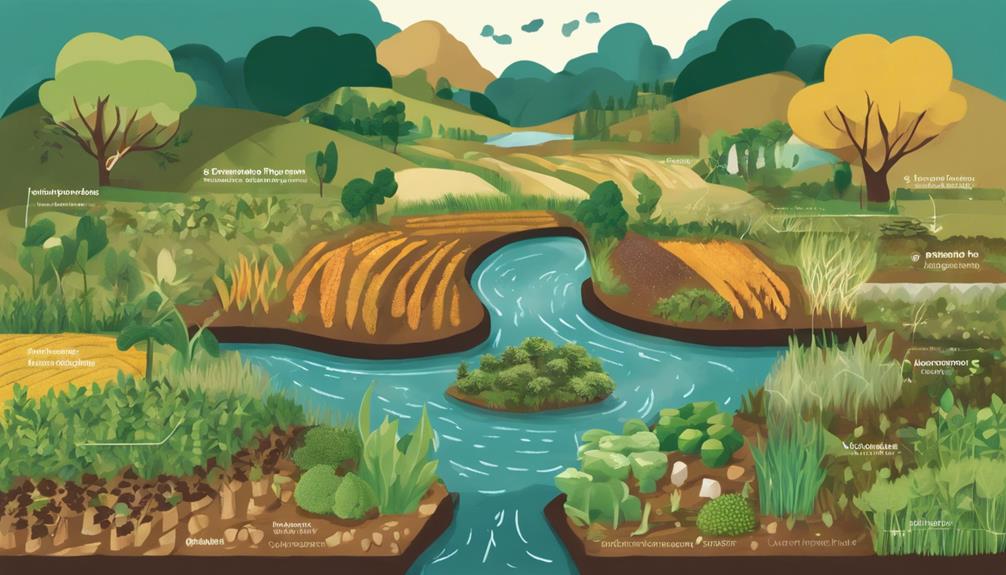7 Best Climate Advantages From Natural Food Consumption
When you consume natural foods, you contribute to reducing carbon footprint. Sustainable agriculture practices help decrease greenhouse gas emissions and support biodiversity. By minimizing synthetic fertilizers and pesticides, soil health is enhanced, ensuring resilient farming systems for food security. Opting for natural foods also aids in soil health improvement by enhancing fertility and nutrient cycling crucial for plant growth. Biodiversity conservation is supported through ecosystem preservation and safeguards natural balance. Water conservation benefits are achieved through efficient water management techniques like drip irrigation, fostering sustainable agriculture and protecting water quality. These advantages highlight the positive impact of natural food consumption on climate and the environment.
Reduced Carbon Footprint
Consuming natural foods can significantly decrease your carbon footprint, contributing to a more sustainable environment. Sustainable agriculture practices play a pivotal role in reducing greenhouse gas emissions and preserving the ecosystem. By opting for natural foods grown through sustainable agricultural methods, you actively support practices that promote biodiversity, soil health, and overall environmental well-being.
Sustainable agriculture focuses on long-term viability by considering the environmental, economic, and social aspects of food production. This approach minimizes the use of synthetic fertilizers and pesticides, which are common contributors to carbon emissions. By choosing foods produced sustainably, you're indirectly supporting the reduction of harmful chemicals in the environment, thus mitigating the adverse effects on both human health and the ecosystem.
Moreover, sustainable agriculture enhances food security by promoting resilient farming systems that can adapt to changing environmental conditions. This resilience is crucial in ensuring a stable food supply for current and future generations. By consuming natural foods from sustainable sources, you aren't only reducing your carbon footprint but also supporting a food system that prioritizes efficiency, biodiversity, and long-term sustainability.
Soil Health Improvement
By supporting sustainable agriculture practices that reduce carbon emissions through the consumption of natural foods, you inadvertently contribute to the enhancement of soil health. Soil health improvement is a crucial aspect of sustainable farming, as it directly impacts soil fertility and nutrient cycling. Healthy soils are essential for the long-term productivity and sustainability of agricultural systems.
Soil fertility is a key component of soil health. It refers to the soil's ability to provide essential nutrients to plants for optimal growth. Sustainable agriculture practices, such as crop rotation, cover cropping, and organic farming, help maintain soil fertility by replenishing nutrients and organic matter in the soil. By consuming natural foods produced using these methods, you support the maintenance of soil fertility in agricultural systems.
Nutrient cycling is another vital process for soil health improvement. It involves the movement and exchange of nutrients between living organisms and the environment. Sustainable farming practices promote nutrient cycling by encouraging natural processes that recycle organic matter and nutrients back into the soil. This cyclic process helps maintain soil health by ensuring a continuous supply of nutrients for plant growth.
Biodiversity Conservation
Biodiversity conservation plays a crucial role in maintaining the balance and resilience of ecosystems. Ecosystem preservation is essential for ensuring the continued existence of a wide variety of species and their habitats. By protecting biodiversity, we safeguard the intricate web of life that sustains ecosystems and supports human well-being.
Wildlife habitat protection is a key component of biodiversity conservation efforts. Preserving natural habitats ensures that various species have the necessary resources to thrive, including food, shelter, and breeding grounds. When habitats are destroyed or fragmented, it can lead to a loss of biodiversity and disrupt the delicate balance within ecosystems.
Studies have shown that areas with high biodiversity tend to be more resilient to environmental changes and disturbances. A diverse array of species can help ecosystems withstand pressures such as climate change, invasive species, and habitat degradation. By conserving biodiversity, we not only protect individual species but also enhance the overall health and stability of ecosystems.
Efforts to conserve biodiversity can take many forms, from establishing protected areas and wildlife corridors to implementing sustainable land management practices. Through these actions, we can help ensure that future generations inherit a world rich in biodiversity and teeming with life. By prioritizing biodiversity conservation, we can safeguard the natural systems that sustain us all.
Water Conservation Benefits
Water conservation benefits can significantly impact ecosystems and human communities alike. Conserving water in agriculture is crucial for ensuring food security and sustainable agricultural practices. When farmers implement water-saving techniques such as drip irrigation or rainwater harvesting, they not only reduce water wastage but also contribute to the preservation of water resources for future generations.
Efficient water management in agriculture plays a vital role in enhancing food security. By using water more effectively, farmers can increase crop yields and ensure a stable food supply. This is particularly important in regions prone to droughts or water scarcity, where optimizing water use can mean the difference between having enough food or facing shortages.
Agricultural practices that focus on water conservation also benefit ecosystems. Excessive water use in farming can lead to water pollution through runoff, affecting the health of aquatic ecosystems. By minimizing water waste and runoff, farmers help protect water quality and preserve biodiversity in rivers, lakes, and oceans.
Decreased Greenhouse Gas Emissions
The reduction of greenhouse gas emissions achieved through sustainable agricultural practices is crucial for mitigating climate change impacts. By choosing natural foods produced through sustainable methods, you contribute to decreased greenhouse gas emissions. Sustainable agriculture focuses on practices that minimize the release of greenhouse gases such as carbon dioxide, methane, and nitrous oxide into the atmosphere. These practices include low tillage farming, agroforestry, and the use of cover crops, all of which help sequester carbon in the soil and reduce the overall carbon footprint of food production.
Energy efficiency benefits are also notable when it comes to reducing greenhouse gas emissions through natural food consumption. Sustainable farming practices often prioritize energy efficiency by utilizing renewable energy sources, optimizing water use, and reducing the reliance on fossil fuels for machinery and transportation. By supporting sustainable agriculture, you indirectly contribute to a more energy-efficient food system that emits fewer greenhouse gases.
Furthermore, natural food consumption has public health advantages linked to decreased greenhouse gas emissions. By choosing foods produced sustainably, you support a system that promotes healthier diets, reduces exposure to harmful chemicals, and minimizes air and water pollution. These public health benefits are interconnected with the environmental benefits of reduced greenhouse gas emissions, creating a more holistic approach to food production and consumption.
Climate Resilience Enhancement
Enhancing agricultural practices to boost climate resilience is a critical component of sustainable food systems. By focusing on resilience building, we can ensure food security in the face of climate change. Here are four key ways in which climate resilience can be enhanced through natural food consumption:
- Diverse Cropping Systems: Implementing diverse cropping systems can help mitigate the impact of extreme weather events. By growing a variety of crops, farmers can increase their resilience to climate fluctuations and reduce the risk of total crop failure.
- Water Management Strategies: Efficient water management is essential for building climate resilience in agriculture. Adopting practices such as rainwater harvesting, drip irrigation, and water recycling can help farmers adapt to changing precipitation patterns and ensure consistent crop yields.
- Soil Health Improvement: Healthy soils are more resilient to climate stressors. Practices like cover cropping, crop rotation, and minimal tillage not only enhance soil health but also increase its capacity to withstand droughts, floods, and other climate-related challenges.
- Agroforestry Integration: Integrating trees into agricultural landscapes through agroforestry systems can improve climate resilience. Trees provide shade, reduce evaporation, and enhance biodiversity, making farms more adaptable to changing environmental conditions.
Sustainable Land Management

Implementing sustainable land management practices is essential for ensuring the long-term productivity and environmental viability of agricultural landscapes. Land restoration plays a crucial role in sustainable land management by improving soil quality, enhancing biodiversity, and mitigating the impacts of climate change. According to the Food and Agriculture Organization (FAO), sustainable land management practices, such as land restoration, can lead to a significant increase in agricultural productivity, ensuring food security for present and future generations.
Organic farming is a key component of sustainable land management. By avoiding synthetic pesticides and fertilizers, organic farming promotes soil health and biodiversity conservation. Research shows that organic farming practices can improve soil structure, water retention, and carbon sequestration capacity, contributing to climate change mitigation efforts. Additionally, organic farming reduces the risk of chemical contamination in water sources and minimizes greenhouse gas emissions associated with conventional agriculture.
Conclusion
In conclusion, consuming natural foods offers numerous climate advantages that are supported by data and research. By reducing carbon footprints, improving soil health, conserving biodiversity, and managing land sustainably, natural food consumption plays a vital role in mitigating climate change.
Additionally, the benefits of water conservation, decreased greenhouse gas emissions, and climate resilience further highlight the importance of incorporating natural foods into our diets for a more sustainable future.
